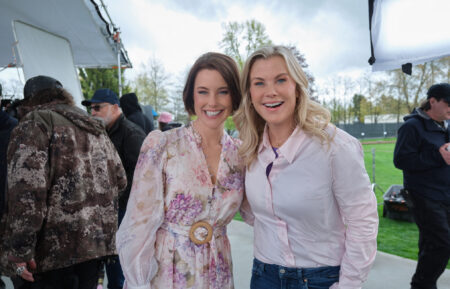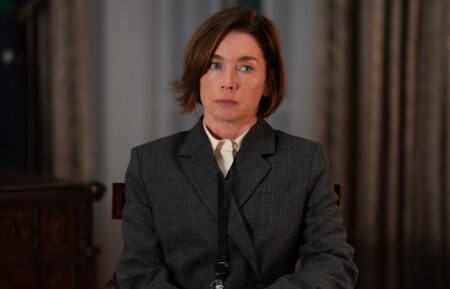‘Servant’: Ishana & M. Night Shyamalan Talk Season 3 & Their Unique Directing Styles
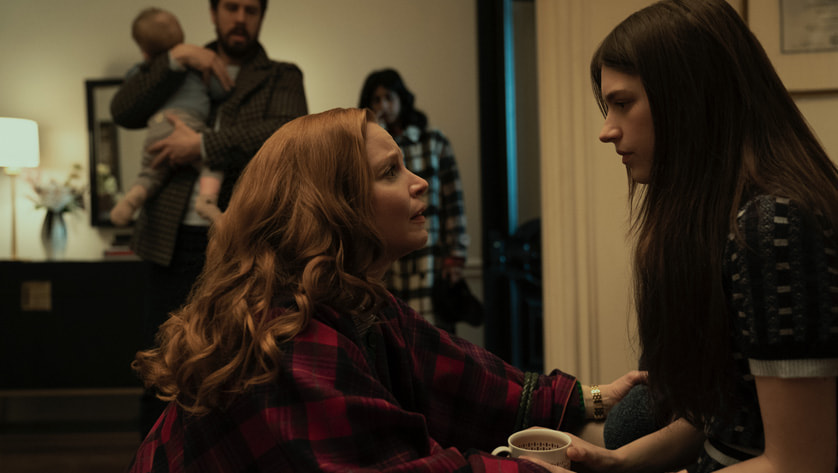
Q&A
Nothing says “family bonding” quite like a parent-child duo teaming together on a hit TV series.
Apple TV+’s Servant returns on January 21 with its third installment, which picks up three months after we left the Turner household. While things appear to be back to normal — Dorothy (Lauren Ambrose) and Sean (Toby Kebbell) dote on Jericho, Julian (Rupert Grint) has a new girlfriend, and Leanne (Nell Tiger Free) has moved back into the brownstone — there’s still the threat of the cult and worries for Jericho’s safety. While the Turners try to keep their family whole, they must come to terms with the costs of Jericho’s return.
Ahead of the new episodes, director and executive producer M. Night Shyamalan and his daughter, Ishana Night Shyamalan — also a writer and director on the series — discuss their time working on set together and what specifically makes their family work dynamic so balanced.
What should viewers expect from this season?
M. Night Shyamalan: I think you can expect a natural rise in the stakes because the cadence of the story is moving to a conclusion. I hope you feel that the storytellers know where it’s going and so are confidently raising the temperature of the boiling water so that it’s more physical. It’s scarier. As a result, it’s more manic and funnier, and there’s more poignancy and more things at stake because we’re getting closer to the conclusion. Hopefully, you can feel where you are: “Oh, wow. We’re in the third part of a four-part story.”
So, as coworkers and father and daughter, what’s it like collaborating together on this project? How would you describe your work dynamic?
Ishana Night Shyamalan: I think the transition into a professional relationship was actually pretty seamless because this sort of mentorship that we have — my dad mentoring me is a lifelong thing. So every dinner table conversation that our family has is about art and a way to think about the world. It’s really been like training me from a young age to enter this new realm of professional work together. And so it’s just an elevation of what our relationship already is. And we have a lot of fun.
I’m so glad to hear that. How do you differ from each other in terms of directing and stylistic approaches?
M. Night: That’s a good question. You answer it after I answer, tell me if you agree, totally give a different answer if you feel like a different answer.
Ishana: Okay! [Laughs]
M. Night: I’m manic on the set: “Let’s go, let’s go, let’s go. What are we doing? We don’t need that. How long is that going to take? I want the flowers on that table.” And I’m on the set, agitated and moving, but everyone starts to acclimate to that thing. I think Ishana has more of, like, an elegant kind of approach that she’s very firm [with] what she wants, but she’s more open I think to new ideas, perhaps. Maybe I’m wrong about it. Tell me what you think.
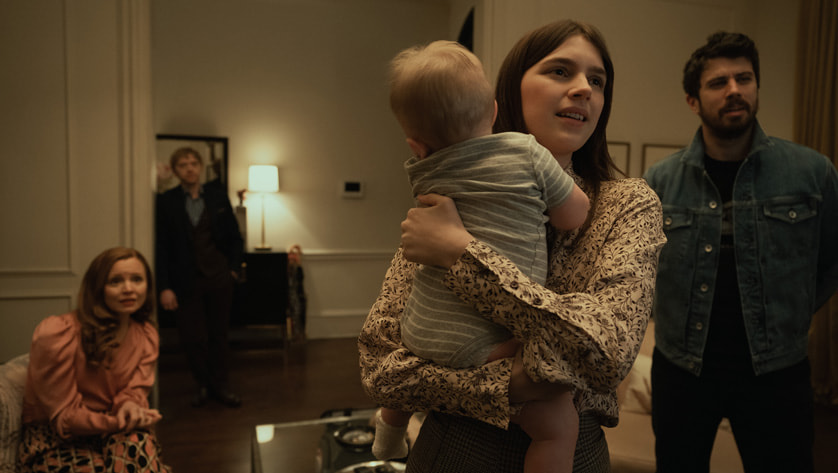
Apple TV+
Ishana: I don’t know that I’m open to new ideas. I definitely agree that our kind of energies on set are very different. And that was an interesting thing to explore, as I was kind of coming into the industry because I’ve… sort of seen [my father] as the goalposts of what directing is. And so kind of coming on to the set and realizing how I wanted to be a little bit of a different way was kind of a journey. I think there’s some sort of central differences between us. He has a sort of masculine version, and I have a feminine version. I think that’s kind of what makes us two sorts of poles of similar taste buds. I love that we’re kind of approaching things in a different way but hoping to accomplish the same levels of precision and intensity.
M. Night: Yes, that’s fascinating what you’re saying because, before Ishana, I was talking to some of our crew members, and I said there are many ways to lead, and we, as a society, have only celebrated masculine attributes of leadership, and that is blindness. And I said we’re going to have female directors that come in that are quiet. [And] they’re thoughtful. And you’re going to walk all over them and you’re going to be dead wrong when you do that because they’re taking [things] in. They’re being nuanced. Wait for a second. They have a different pacing, a different cadence, and [one must] let them [in] here. They’re going to come up with amazing, incredibly provocative ideas; just step back and listen in a different way to this cadence. So this thing that we’re talking about, there should be many ways to lead. And I don’t think, as a society we have realized that — obviously, in our political leaders as well.
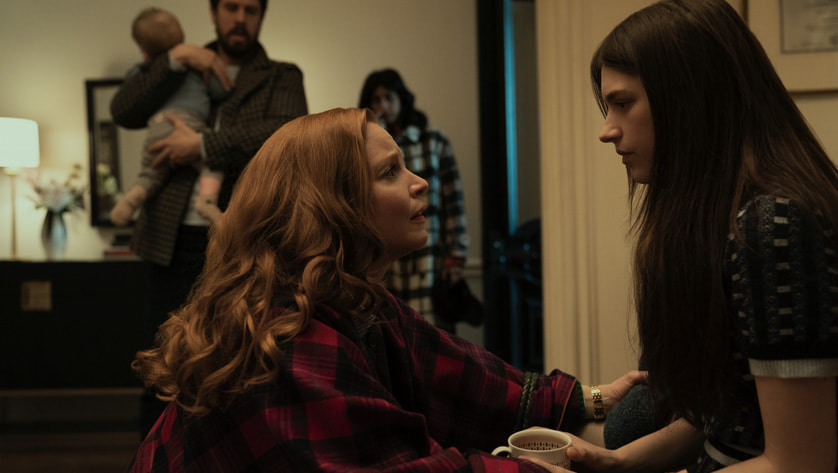
Apple TV+
It’s crucial for more diverse voices to be brought to the table because then that makes a more cohesive and authentic story!
M. Night: Can I say one more thing? Because it’s just on my mind. It was really interesting; I was thinking about Ishana. I was there on a set when she was directing the finale. And [she was] directing those close-ups, which you’ll see eventually when you see the finale. But she was directing a scene with close-ups of the actors. And they were, well, let’s just say that I would have jumped in and said something strong about the way they were conducting themselves at that moment.
And Ishana didn’t. And she kind of guided them to where they were going to need it to go. And she got the performances. And I loved that scene. And what she got was fantastic. And I remember going, I would have blown up the house here. I would have made a big stink here, and that probably would have been okay in that moment, maybe, but would have worn on the cast and the crew. There’s a time for gentleness and a time for firmness, and they’re both needed. And I remember watching that and thinking, I need to work on that side of me because I’m going to lose opportunities and lose nuance. So it was something I was learning from her.
Ishana: Well, that’s cool. I didn’t know that.
I’m excited to see that scene. Oh, my God. It sounds beautiful!
M. Night: Just to remind you when you see it, they’re all drinking something, so tha’s when they’re all drinking the same thing.

Apple TV+
Last season also proved that these characters can be really funny. Why is it important to add humor to this particular story? Ishana, what’s it like in the writer’s room with that much dark humor?
Ishana: I think part of it is sort of natural in that way. I think my dad is really funny. I think a lot of the writers in the room are really funny, so that just kind of comes naturally to, I think, a bunch of the people on the creative team, but also more spiritually. I think nothing in life is ever just bad. And lots of times our negative experiences, we cope with them. Or we’re simultaneously experiencing humor and irony. And that just makes a more complex sense of what you actually do experience in human life. So to strip that of the humor, I think would be taking out a dimension of what the human emotion is really about.
Well, congrats on season three, and congrats on getting an early renewal for season four! Have you and the team already mapped out how the series is going to play out, or are there new ideas that come to mind?
M. Night: No, we’re done. I hired the writers without knowing we were going to get a green light for season four because to do what we’re doing on this timetable that we’re doing it. I don’t want to be writing while we’re shooting, so to do it the proper way we had to do it like this. That’s why it’s so difficult to do a show. My hat’s off to all the showrunners of the classic shows — David Chase, you name it, all these guys. I don’t know how he did it. It’s incredible. And so we’ve done six episodes. We’ve written six episodes and we’re deep into it and we’ve outlined the other four.
Servant, Season 3 Premiere, Friday, January 21, Apple TV+
From TV Guide Magazine
What to Expect From 'The Hunting Party's Love Triangle and Mystery
Manifest alum Melissa Roxburgh and the showrunner of NBC’s Hunting Party tease TV Guide Magazine about what’s ahead for the “government conspiracy that just keeps unfolding” — plus, the series’ “good” love triangle. Read the story now on TV Insider.






